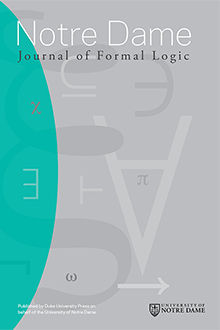Abstract
In this paper I examine the nature of Russell's ramified type theory resolution of paradoxes. In particular, I consider the effect of construing the types in Church's cumulative sense, that is, the range of a variable of a given type includes the range of every variable of directly lower type. Contrary to what seems to be generally assumed, I show that the decision to make the levels cumulative and allow this to be reflected in the semantics is not neutral with respect to the solution of the paradoxes. I introduce a distinction between syntactical and semantical cumulativeness. It turns out that noncumulative type theories (in either sense) are equally capable of dealing with the paradoxes. Furthermore, whether cumulativeness is appropriate appears to be context dependent.
Citation
Anthony F. Peressini. "Cumulative versus Noncumulative Ramified Types." Notre Dame J. Formal Logic 38 (3) 385 - 397, Summer 1997. https://doi.org/10.1305/ndjfl/1039700745
Information





